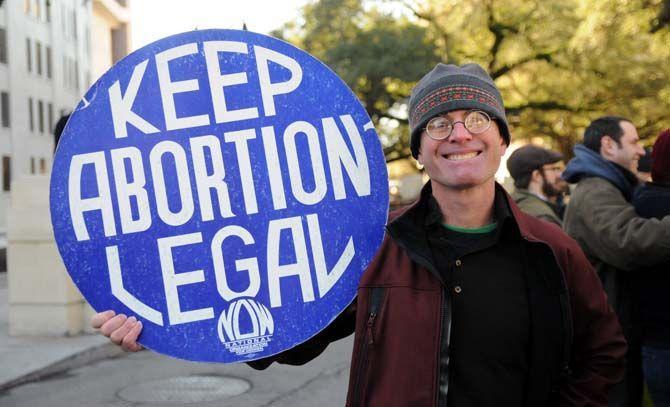Congress is trying as hard as possible to make abortions unattainable.
Its newest attempt at robbing people of their reproductive rights comes in the form of a bill that bans all taxpayer money from funding abortions. Ironically, the bill passed the House on Jan. 22, the 42nd anniversary of the Roe v. Wade decision that granted all Americans the constitutional right to an abortion.
This was Plan B for Congress.
Plan A, the “Pain Capable Unborn Child Protection Act,” was abandoned Wednesday night after multiple Republican women came forward and said the bill went too far. The act would have proposed a ban on all abortions following the 20-week mark of a pregnancy.
Plan B, also known as H.R. 7, the “No Taxpayer Funding for Abortion and Abortion Insurance Full Disclosure Act of 2014” , would withhold abortion services from anyone using Medicare, Medicaid, insurance purchased through the Affordable Care Act’s healthcare exchange and all public employees who are insured through their offices.
This bill makes it impossible for anyone under any sort of financial strain to obtain a safe, legal abortion. Those who can finance their own procedures, which can range in cost from $350 to several thousand dollars, remain largely unaffected by this bill.
Conservatives have a long history of blocking taxpayer funds from financing reproductive care.
In 1976, three years after the passage of Roe v. Wade, Congress passed the Hyde Amendment, barring any Medicaid funding of abortion. In the years prior to the Hyde Amendment’s passing, federal Medicaid was responsible for covering one-third of all abortions performed in the U.S.
Henry Hyde, the Illinois Republican who introduced the bill, stated he “would certainly like to prevent any woman from having an abortion: a rich woman, a middle class woman or a poor woman.
“Unfortunately,” he went on, “the only vehicle available is this bill.”
Since going into effect in 1977, the Hyde Amendment has disproportionately affected minority communities, barring many women of color from obtaining the reproductive care that they need.
After the Supreme Court upheld the constitutionality of the amendment in 1980, Justice Thurgood Marshall summed up the bill’s motives, stating Hyde is “designed to deprive poor and minority women of the constitutional right to choose an abortion.”
This was not political posturing — it was a fact that was proven by Rosie Jiménez. In 1977, the 27-year-old college student and single mother needed an abortion. However, because she was on Medicaid at the time, her doctor turned her away.
Desperate, Jiménez crossed the border into Mexico in an effort to obtain an illegal procedure. She died seven days later from complications of the unsafe operation. Her fate was the same as countless other, unknown women who needed safe and legal abortions.
H.R. 7, if passed, would go beyond the Hyde Amendment in a number of ways, such as banning public health facilities from providing abortion services, outlawing the use of tax credits to purchase insurance that would fund an abortion and raising taxes on small businesses that include abortion care in their covered service.
Even worse, the bill would remove the exceptions the Hyde Amendment currently has in place. As of now, Hyde allows for federal funding to be used in an abortion in the cases of rape, incest or a pregnancy that endangers the life of the mother. H.R. 7 contains no such exceptions.
The Guttmacher Institute recently found, when Medicaid use is restricted, one-in-four low-income women are forced to carry an unwanted pregnancy to term. If H.R. 7 becomes a law, that number would undoubtedly rise.
President Obama stated Thursday morning if this bill were to make it to his desk, he would absolutely veto it. But this bill is more than just an attempt to block low-income women from receiving the reproductive care they need — it is a message from the Republican- controlled legislature on what they will focus on for the duration of Obama’s presidency.
Republicans plan to spend the next two years doing everything they can to undermine reproductive rights. Hopefully, they don’t make any achievements because, if they do, Rosie Jiménez’s story will cease being a cautionary tale of what happens when abortion restrictions go too far, and instead become a common reality that the American people have to face.
Logan Anderson is a 21-year-old mass communication senior from Houston, Texas. Follow her on Twitter @LoganD_Anderson.
Opinion: New abortion bill could lead to more unsafe, illegal procedures
January 25, 2015
Protesters hold an event to oppose The Response on Saturday, Jan. 24, 2015, outside of the Pete Maravich Assembly Center.
More to Discover








